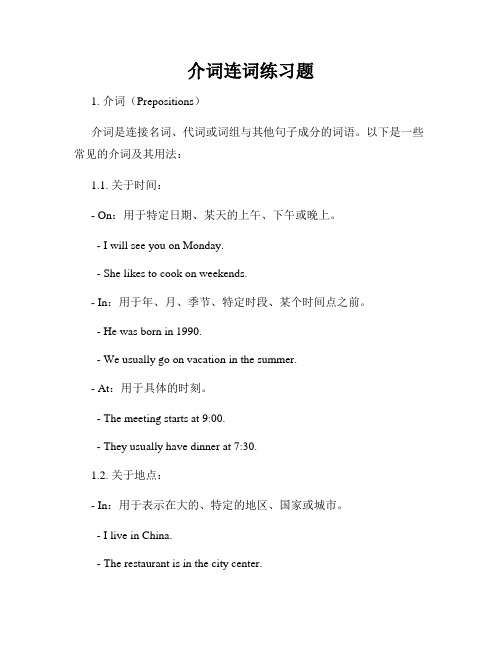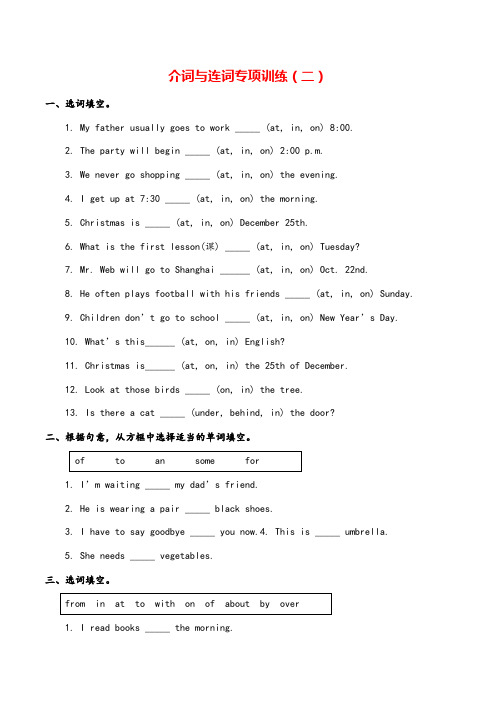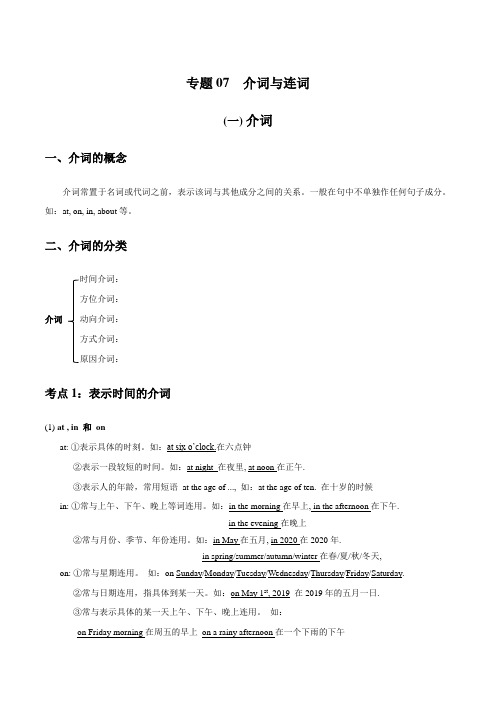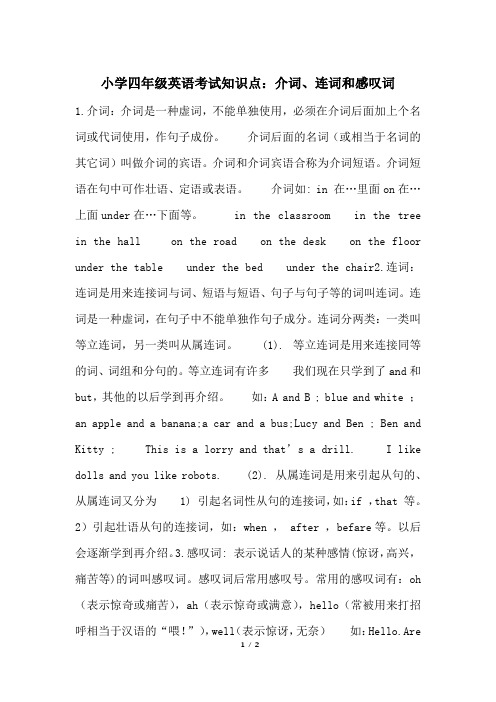小学英语介词和连词专项复习
介词连词练习题

介词连词练习题1. 介词(Prepositions)介词是连接名词、代词或词组与其他句子成分的词语。
以下是一些常见的介词及其用法:1.1. 关于时间:- On:用于特定日期、某天的上午、下午或晚上。
- I will see you on Monday.- She likes to cook on weekends.- In:用于年、月、季节、特定时段、某个时间点之前。
- He was born in 1990.- We usually go on vacation in the summer.- At:用于具体的时刻。
- The meeting starts at 9:00.- They usually have dinner at 7:30.1.2. 关于地点:- In:用于表示在大的、特定的地区、国家或城市。
- I live in China.- The restaurant is in the city center.- On:用于表示在街道、大街、公路等具体地点。
- The post office is on Main Street.- The accident happened on the highway.- At:用于表示在具体的建筑、地址或地方。
- She is waiting for you at the cinema.- They will meet at the coffee shop.1.3. 关于方式:- By:用于表示通过某种交通工具、方式或手段。
- I usually go to work by bus.- We communicate by email.- With:用于表示携带某物或与某人一起。
- He always goes to the gym with his friends.- She wrote the letter with a pen.2. 连词(Conjunctions)连词是连接两个词、短语、从句或句子的词语。
介词和连词专题复习(经典、全面)

介词和连词专题复习(经典、全面)介词和连词专题复介词简介介词是一类用来连接名词、代词或者名词性短语与其他句子成分的词语。
它们用来表示位置、方向、时间、原因、目的等关系。
常见介词以下是一些常见的介词及其用法:in:表示位置、时间等,如 in the park(在公园里)、in the morning(在早晨)on:表示位置、时间等,如 on the table(在桌子上)、on Monday(在周一)at:表示位置、时间等,如 ___(在车站)、at 2 o'clock(在2点钟)to:表示方向,如 go to school(去学校)from:表示源起,如 ___ China(来自中国)for:表示目标、目的,如 study for the exam(为考试研究)连词简介连词是一类用来连接句子、短语或词语的词语。
它们用于构建复合句,表示并列、因果、条件、转折等关系。
常见连词以下是一些常见的连词及其用法:and:表示并列,如 I like ___(我喜欢咖啡和茶)or:表示选择,如 ___?(你想要咖啡还是茶?)but:表示转折,如 I am tired。
but I need to ___(我累了,但是我需要完成我的工作)because:表示原因,如 I ___ at home because it was raining(我呆在家里是因为下雨了)if:表示条件,如 If it rains。
we will stay indoors(如果下雨,我们就会呆在室内)以上是介词和连词的一些基本知识和常见用法。
通过熟悉和掌握它们的使用方法,我们可以更准确地写出连贯的句子和段落。
六年级下册PEP_介词与连词 2总复习

介词与连词专项训练(二)一、选词填空。
1. My father usually goes to work _____ (at, in, on) 8:00.2. The party will begin _____ (at, in, on) 2:00 p.m.3. We never go shopping _____ (at, in, on) the evening.4. I get up at 7:30 _____ (at, in, on) the morning.5. Christmas is _____ (at, in, on) December 25th.6. What is the first lesson(课) _____ (at, in, on) Tuesday?7. Mr. Web will go to Shanghai ______ (at, in, on) Oct. 22nd.8. He often plays football with his friends _____ (at, in, on) Sunday.9. Children don’t go to school _____ (at, in, on) New Year’s Day.10. What’s this______ (at, on, in) English?11. Christmas is______ (at, on, in) the 25th of December.12. Look at those birds _____ (on, in) the tree.13. Is there a cat _____ (under, behind, in) the door?二、根据句意,从方框中选择适当的单词填空。
of to an some for1. I’m waiting _____ my dad’s friend.2. He is wearing a pair _____ black shoes.3. I have to say goodbye _____ you now.4. This is _____ umbrella.5. She needs _____ vegetables.三、选词填空。
【小升初】英语总复习课件 - 专题-第18课时 介词与连词 (含答案) 全国通用

( C )37.We can listen ________ the music ________ home. A.at; to B.on; at C.to; at
( B )38.Which do you like better, carrots ________ peas? A.but B.or C.and
3.在九点__a_t_n_i_n_e__o_'c_l_ock 4.乘地铁__b_y_s_u_b_w__a_y__
5.在桌子上__o_n__th_e__d_e_s_k_ 6.放学后_a_f_te_r_s_c_h_o_o_l__
7.在门后_b_e_h_i_n_d__th_e__d_oor 8.在教室里_.i_n_t_h_e__cl_a_s_s_ro_om
④because “因为……”,表示原因。
⑤so “所以;那么……”,表示结果。
单项选择。
( )We usually stay ________ home ________ Saturday afternoon.
A.at; in
B.at; on
C.in; at
【解析】本题考查常见介词的用法。stay at home意为“ 待在家”,表示在某天的上午、下午或晚上,用介词on。
( C )35.This is the Palace Museum. It's very old ________ beautiful. A.or B.and C.but
( B )36.My sister goes to school ________ bus every day. A.with B.by C.in
表时间的介词
晚上
in 2014 在 2014 年 in May 在五月 in summer 在夏季
最新人教pep版小学英语毕业专项复习——第二部分 词类梳理 第六节介词和连词

2. be+形容词+介词
be afraid of 害怕 be angry with 生气 be close to 接近于
be famous for 因……出名
be full of 充满
be good at 擅长于 be proud of 为……感到自豪
be short of 缺乏 be late for 迟到……
返回目录
2. above, over, on above:意为“在……上方”,不强调是否正对,与 below相对应。
如: The bird is flying above my head.小鸟在我头上飞。 over:意为“在……正上方”,与under相对应,与物体之间不直 接接触。如: There is a bridge over the river. 河上有一座桥。 on:表示在某物体上面并与之接触,其对应词也是under。如: His watch is on the desk. 他的手表在桌子上。
返回目录
五、常见连词及其用法 1. and意为“和”。如: I like cabbages and carrots. 我喜欢卷心菜和胡萝卜。 2. both … and … 意为“……和……(两者)都……”。如: Both you and I are in Class Six this year. 今年我和你在都在六班。
返回目录
2. in, after in:“in+一段时间”表示在将来的一段时间的以后。如:
My mother will come back in three days. 我妈妈将会在三天后回来。 after:“after+一段时间”表示在过去的一段时间的以后。如:
He arrived in Beijing after five months. 在五个月之后他到达了 北京。 “after+将来的时间点”表示在将来的某一时刻以后。如: She will come after five o'clock this afternoon. 她会在今天下午五 点钟之后来。
专题07 介词与连词_备战2021年小升初英语必考语法和题型(解析版)

专题07 介词与连词(一)介词一、介词的概念介词常置于名词或代词之前,表示该词与其他成分之间的关系。
一般在句中不单独作任何句子成分。
如:at, on, in, about等。
二、介词的分类时间介词:方位介词:介词动向介词:方式介词:原因介词:考点1:表示时间的介词(1) at , in 和onat: ①表示具体的时刻。
如:at six o’clock.在六点钟②表示一段较短的时间。
如:at night 在夜里, at noon在正午.③表示人的年龄,常用短语at the age of ..., 如:at the age of ten. 在十岁的时候in: ①常与上午、下午、晚上等词连用。
如:in the morning在早上, in the afternoon在下午.in the evening在晚上②常与月份、季节、年份连用。
如:in May在五月, in 2020在2020年.in spring/summer/autumn/winter在春/夏/秋/冬天, on: ①常与星期连用。
如:on Sunday/Monday/Tuesday/Wednesday/Thursday/Friday/Saturday.②常与日期连用,指具体到某一天。
如:on May 1st, 2019 在2019年的五月一日.③常与表示具体的某一天上午、下午、晚上连用。
如:on Friday morning在周五的早上on a rainy afternoon在一个下雨的下午on the evening of May 5th在五月五日的晚上(2) before 和after 用来表示时间的先后顺序before:在……之前after:在……之后如:Spring comes before summer. 夏天之前是春天。
Come to my office after class. 放学后来我的办公室。
(3) from 用来表示从某段时间开始的动作,常与to 连用构成短语“from…to…”译为“从……到……”。
小学英语毕业总复习:介词与连词专项训练(一)

介词与连词专项训练(一)一、单项选择。
( ) 1. ____, where did he go?A. By the wayB. On the wayC. In a wayD. In the way( ) 2. Welcome ____ our class.A. twoB. tooC. to( ) 3. —Where is the teachers’ office? —It’s ____ the second floor.A. onB. inC. near( ) 4. All of these postcards are ____ Canada.A. fromB. forC. of( ) 5. Please tell me more ____ your city.A. ofB. aboutC. from( ) 6. It’s a picture _____ the Huangshan Mountain.A. ofB. withC./( ) 7. New York is _____ of America.A. in eastB. in the eastC. at the east( ) 8. I’m fat. I have ____ eat vegetables. They are healthy.A.\B. toC. on( ) 9. My parents like to go _____ a walk.A. toB. atC. for( ) 10. Please tell me _____ your country.A. withB. ofC. about( ) 11. Do you often read books _____ the weekend?A. fromB. onC. to( ) 12. What do you have _____ Monday?A. inB. onC. at( ) 13. He wants to buy a car ______ himself.A. atB. onC. for( ) 14. She buys a card ______ me.A. onB. toC. for( ) 15. Mocky had a birthday gift ______ Ken.A. onB. inC. for( ) 16. Are you going to take part ________ the meeting?A. onB. atC. in( ) 17. Please send an email _____ me.A. toB. forC. on ( ) 18. Is your home far _____ the school?A. atB. inC. from ( ) 19. What can they do ______ the party?A. onB. withC. for ( ) 20. Welcome ______ my home.A. toB. tooC. two ( ) 21. The hospital is next ____ the museum.A. toB. atC. on ( ) 22. He gave a box of chocolate _____ me.A. fromB. toC. for ( ) 23. I was born ____ the year of the tiger.A. atB. onC. in ( ) 24. I am going to come _____ Monday morning.A. inB. onC. at ( ) 25. My mum can make clothes ____ hand.A. byB. onC. in 26.( ) 26. It’s too small ____ her now.A. ofB. toC. for ( ) 27. I love swim ____ the sea.A. inB. toC. at ( ) 28. He is wearing a pair _____ sunglasses.A. ofB. onC. for ( ) 29. Look at this photo ____ her.A. withB. ofC. for ( ) 30. I have to say goodbye _____ you now.A. withB. toC. for ( ) 31. Is it a man ______ a woman?A. andB. orC. with ( ) 32. He is wearing a blue suit _____ a silver tie.A. withB. inC. of ( ) 33. I go to school _____ bus.A. driveB. byC. on ( ) 34. It’s time ____ breakfast.A. ofB. atC. for。
小学四年级英语考试知识点:介词、连词和感叹词

小学四年级英语考试知识点:介词、连词和感叹词1.介词:介词是一种虚词,不能单独使用,必须在介词后面加上个名词或代词使用,作句子成份。
介词后面的名词(或相当于名词的其它词)叫做介词的宾语。
介词和介词宾语合称为介词短语。
介词短语在句中可作壮语、定语或表语。
介词如: in 在…里面on在…上面under在…下面等。
in the classroom in the tree in the hall on the road on the desk on the floor under the table under the bed under the chair2.连词:连词是用来连接词与词、短语与短语、句子与句子等的词叫连词。
连词是一种虚词,在句子中不能单独作句子成分。
连词分两类:一类叫等立连词,另一类叫从属连词。
(1). 等立连词是用来连接同等的词、词组和分句的。
等立连词有许多我们现在只学到了and和but,其他的以后学到再介绍。
如:A and B ; blue and white ;an apple and a banana;a car and a bus;Lucy and Ben ; Ben and Kitty ; This is a lorry and that’s a drill. I like dolls and you like robots. (2). 从属连词是用来引起从句的、从属连词又分为1) 引起名词性从句的连接词,如:if ,that 等。
2)引起壮语从句的连接词,如:when , after ,befare等。
以后会逐渐学到再介绍。
3.感叹词: 表示说话人的某种感情(惊讶,高兴,痛苦等)的词叫感叹词。
感叹词后常用感叹号。
常用的感叹词有:oh (表示惊奇或痛苦),ah(表示惊奇或满意),hello(常被用来打招呼相当于汉语的“喂!”),well(表示惊讶,无奈)如:Hello.Areyou Mary?网络搜集整理,仅供参考。
- 1、下载文档前请自行甄别文档内容的完整性,平台不提供额外的编辑、内容补充、找答案等附加服务。
- 2、"仅部分预览"的文档,不可在线预览部分如存在完整性等问题,可反馈申请退款(可完整预览的文档不适用该条件!)。
- 3、如文档侵犯您的权益,请联系客服反馈,我们会尽快为您处理(人工客服工作时间:9:00-18:30)。
常见介词及用法(一)表示时间的介词1.英语里最常见的时间介词有:at, in, on, before, after和from。
2.at , in和on这三个词都表示时间。
✧at主要指具体的钟点:at half past eight 在八点半✧in一般指某一段时间:in January 在一月份✧on指具体在某一天:on Monday 在星期一3.before和after表示时间的先后顺序。
✧before表示“在……之前”。
You should wash your hands before eating. 吃饭前你应该洗手。
✧after表示“在……之后”。
They often play basketball after dinner. 他们放学后经常打篮球。
4.from作时间介词含有“从……开始”的意思,常和to连用,组成“from…to…”的结构,表示“从……到……”的意思。
We go to school from Monday to Friday. 我们从周一到周五上学。
(二)表示方位的介词,也就是表示位置和地点的介词。
1.小学阶段常见的方位介词有:on, in, at, under, over, above, below,about, around, between等。
2.on, over和above这三个词都有“在……上面”的意思,但它们所表示的方位还是有些不同。
✧on表示两个物体的表面相互接触。
如:There is a book on the desk. 桌上有一本书。
The boy is sleeping on the desk. 那个孩子睡在地上。
✧over表示“在……的正上方”,两个物体表面没有接触。
如:There is a light bulb over my head. 在我头顶上有一个灯泡。
✧above表示两个物体中一个在另一个的上方,如:The plane is flying above the clouds. 飞机上云层上飞行。
There are four lights above our head. 在我们头上有四盏灯。
3.under和below都有“在……的下面”的意思,但它们有区别:✧under表示“在……的正下方”,其反义词是over。
There is a ball under the chair. 椅子下面有一个球。
They are sitting under a big tree. 他们正坐在一棵大树下面。
✧below表示“在……”的下面,不强调是否在正下方。
Their house is below mine. 他们家的房子在我家的下面。
4.in表示位置“在……里面”,也可以用来表示在一个很大的空间内。
The children are playing in the room. 孩子们正在房间里玩。
All my books are in my bag. 我所有的书都在我的书包里。
5.at表示“在……旁边”。
The teacher is standing at the desk. 老师正在桌边。
I will wait for you at the station. 我会在车站等你。
6.around表示“在……周围”。
There are lots of flowers around the house. 房子周围有许多花。
The children sat around the Christmas tree and sang happily.孩子们围坐在圣诞树旁边高兴地唱歌。
7.behind表示“在……的后面”。
Don’t h ide yourself behind a tree. 别躲在树后。
8.in front of表示“在……的前面”。
There are some trees in front of the house. 房子前面有一些树。
9.between表示“在两者之间”。
My home is between the two mountains. 我家在两座大山之间。
Guang Jie sits between Li Lei and Fang Ning. 冠杰坐在李磊和芳宁之间。
(三)表示动向的介词。
在英语中,有一类介词,它们表示的不是静止不动的方位,而是一种动态的移动,有“朝着……”和“向着……”的意思。
1.小学阶段常见的动向介词有:into, out of, up, down, from, to, through,along等。
2.into和out ofinto表示“从外向里”的意思,out of表示“从里向外”的意思。
Jane jumped into the water. 简跳进了水里。
Don’t look out of the window when you take a bus.当你乘公共汽车时不要向窗外看。
3.up和down: up表示“向上”,down表示“向下”。
He often climbs up mountains. 他经常爬山。
She opened the door and went down the stairs. 她开门下楼。
(四)表示方式的介词1.常见的表示方式的介词有:by, with, in等。
2.by表示“靠……”,“用……”。
3.with表示“使用……”,“和……一起”,“有……”,“具有……”“带有……”。
4.in表示“用……(语言)”。
My father goes to work by car. 我父亲开车上班。
I can see with eyes. 我能用眼睛看。
I can speak in English. 我会用英语讲。
(五)其它常用介词。
1.for表示“目的”,“原因”。
He went home for his book. 他回家拿书。
Thank you for your dinner. 谢谢你的款待。
2.in表示“穿着”,“带着”。
Lily is in a red skirt today. 丽丽今天穿着一条红色的裙子。
The boy in blue is my brother. 穿蓝色衣服的男孩是我弟弟。
3.of表示所属关系,有“……的”意思。
This is a map of ChinA. 这是一幅中国地图。
He is an old friend of mine. 他是我的一位老朋友。
4.like表示比较,意思是“像……”。
He looks like his father. 他看上去像他爸爸。
(六)介词与动词的固定搭配。
look at 朝……看 laugh at 嘲笑……be good at 擅长于……shout at 对…….叫喊look for 寻找 ask for 向……要……look after 照顾,照看look like 看起来像take care of 关心,照顾wait for等待leave for 动身去 start for 动身去catch up with 赶上 talk about 谈论have a talk with 和……交谈agree with 同意,赞成二、常用词及短语搭配的用法:(一)and意思是“和”,表示并列和对称。
I can speak English and Chinese. 我会讲英语和中文。
I like apples, bananas and grapes. 我喜欢苹果、香蕉和葡萄。
(二)both…and…的意思是“两者都……”,表示并列。
Both you and I are pupils. 你和我都是小学生。
I can speak both English and French. 我既会讲英语又会讲法语。
(三)not only…but also…意思是“不但……而且……”,表示并列。
Not only you but also Jim comes late. 不光是你,吉姆也迟到了。
I can play not only the guitar but also the piano. 我有仅会弹吉他,还会弹钢琴。
(四)neither…nor…意思是“既不……也不……”,表示并列关系。
Neither you nor he is right. 你和他都不对。
He can speak neither English nor French. 他既不会讲英语,也不会讲法语。
注意:1.当not only…but only…和neither…nor…连接两个主语时,谓语动词的数的变化随接近谓语动词的主语而变化。
Neither you nor he is fat. 你和他都不胖。
Neither he nor I am right. 他和我都不对。
2.or意思是“或者”,“还是”,表示选择。
Is your friend is a boy or a girl? 你的朋友是男孩还是女孩?Do you learn English or French? 你学英语还是法语?注意:(误)I don’t like coffee and teA.(正) I do n’t like coffee or teA. 我不喜欢喝咖啡和茶。
(正)I like coffee and teA. 我喜欢喝咖啡和茶。
3.but意思是“但是”,表示转折。
I have a cold, but I don’t take medicine. 我感冒了,但我没吃药。
The skirt is nice, but it’s too expensive. 这条裙子很漂亮,但太贵了。
4.so意思是“因此”,“所以”。
It’s dark, so I must go now. 天黑了,所以我得走了。
You got up too late, so you missed the bus. 你起床晚了,所以错过了公共汽车。
5.because意思是“因为”,表示原因。
She is unhappy because she lost the game. 她不高兴,因为她输了比赛。
注意:在英语里,because和so不能够同时在一个句子中出现,和汉语有一定的区别。
(误)Because Mom bought me a new book, so I was very happy.(正)Mom bought me a new book, so I was very happy.(正)I was very happy because Mom bought me a new book.易错点:1.你能找到这个问题的答案吗?[误] Can you find the answer of this question?[正] Can you find the answer to this question?[析]英语中用“the answer to …”表示“……的答案”。
